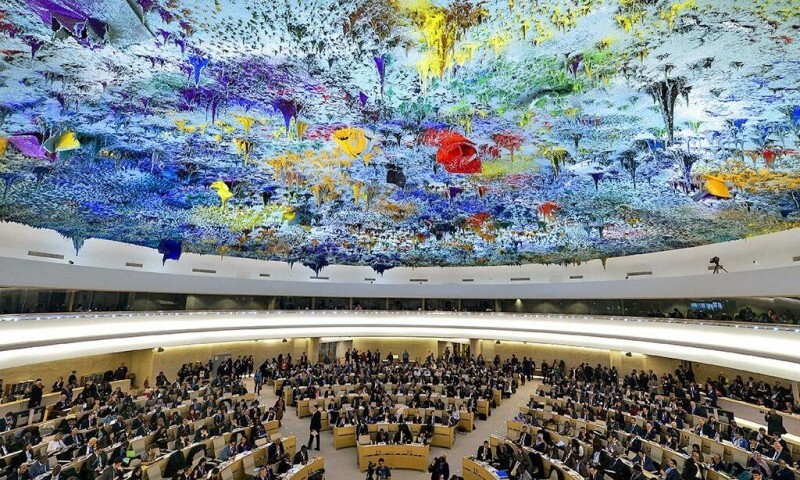The event, organized in partnership with the African Centre for Democracy and Human Rights Studies (ACDHRS) and sponsored by the Permanent Mission of the Kingdom of Morocco to the UN, will take place on the sidelines of the 57th session of the Human Rights Council at the Palais des Nations in Geneva.
The focus of the event will be on justice, reform, and memory in transitional justice processes.
Moroccan, UN, and international experts will come together to explore key aspects of the connections between transitional justice processes, reform, and the effectiveness of human rights.
Discussions will cover redress mechanisms, approaches to memory preservation, and key themes such as sustainable reconciliation, social stability, and development.
In a statement shared with Morocco World News (MWN), Amina Bouayach, Chairperson of the CNDH, emphasized the relevance of this gathering at a time when transitional justice mechanisms are becoming increasingly important in light of ongoing global conflicts.
She noted that Morocco’s experience, rooted in a sovereign decision, forward-looking vision, and effective stakeholder inclusion, highlights the role of transitional justice in strengthening human rights, preventing violations, and providing guarantees of non-repetition.
“This experience has also stimulated a continuous process of legal and democratic reform,” Bouayach added.
The event will start with opening remarks by Amina Bouayach, Omar Zniber, President of the UN Human Rights Council, and Hannah Forster, Executive Director of the ACDHRS.
Discussions and interactions will be facilitated by Nahla Haidar, member of the UN Committee on the Elimination of Discrimination Against Women (CEDAW).
Panelists include Abdelhay Moudden, former member of the Equity and Reconciliation Commission, Bernard Duhaime, Special Rapporteur on the promotion of truth, justice, reparation and guarantees on non-recurrence, and Julia Raue, expert and advisor on transitional justice at the Office of the High Commissioner for Human Rights.
The Equity and Reconciliation Commission was established by royal decree on January 7, 2004, following a recommendation from the Advisory Council on Human Rights (now the National Human Rights Council).
The Commission was tasked with addressing past human rights violations and promoting reconciliation, serving as a truth and reconciliation commission for Morocco.
Its mandate covered a period of 43 years, from 1956 to 1999, making it one of the longest-running truth commissions in the world.
The focus of the event will be on justice, reform, and memory in transitional justice processes.
Moroccan, UN, and international experts will come together to explore key aspects of the connections between transitional justice processes, reform, and the effectiveness of human rights.
Discussions will cover redress mechanisms, approaches to memory preservation, and key themes such as sustainable reconciliation, social stability, and development.
In a statement shared with Morocco World News (MWN), Amina Bouayach, Chairperson of the CNDH, emphasized the relevance of this gathering at a time when transitional justice mechanisms are becoming increasingly important in light of ongoing global conflicts.
She noted that Morocco’s experience, rooted in a sovereign decision, forward-looking vision, and effective stakeholder inclusion, highlights the role of transitional justice in strengthening human rights, preventing violations, and providing guarantees of non-repetition.
“This experience has also stimulated a continuous process of legal and democratic reform,” Bouayach added.
The event will start with opening remarks by Amina Bouayach, Omar Zniber, President of the UN Human Rights Council, and Hannah Forster, Executive Director of the ACDHRS.
Discussions and interactions will be facilitated by Nahla Haidar, member of the UN Committee on the Elimination of Discrimination Against Women (CEDAW).
Panelists include Abdelhay Moudden, former member of the Equity and Reconciliation Commission, Bernard Duhaime, Special Rapporteur on the promotion of truth, justice, reparation and guarantees on non-recurrence, and Julia Raue, expert and advisor on transitional justice at the Office of the High Commissioner for Human Rights.
The Equity and Reconciliation Commission was established by royal decree on January 7, 2004, following a recommendation from the Advisory Council on Human Rights (now the National Human Rights Council).
The Commission was tasked with addressing past human rights violations and promoting reconciliation, serving as a truth and reconciliation commission for Morocco.
Its mandate covered a period of 43 years, from 1956 to 1999, making it one of the longest-running truth commissions in the world.

